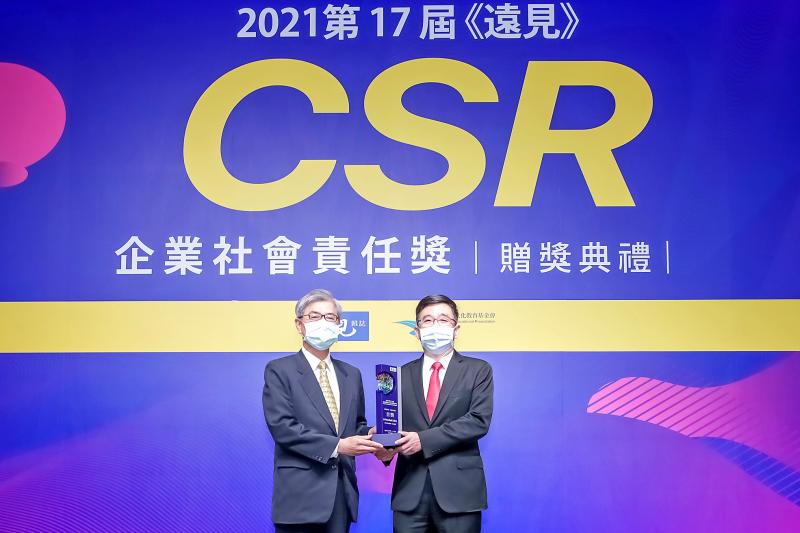HSBC Bank Taiwan Ltd (匯豐台灣商銀) plans to adopt several approaches to build a happy workplace for its employees, chief executive officer Adam Chen (陳志堅) said yesterday.
Chen’s comment came after the bank ranked first among all domestic companies to win Chinese-language Global Views Monthly magazine’s Happy Enterprise Award on Monday.
“We can only be cheerful about winning the prize for a short moment, as creating a pleasant work environment is an ongoing journey and we cannot relax and stop,” Chen told the Taipei Times in a telephone interview yesterday.

Photo courtesy of HSBC
The magazine said that HSBC Bank Taiwan’s flexible working arrangements was one of the reasons it was a happy enterprise.
Chen said that the bank would continue its flexible working arrangement even after the COVID-19 pandemic ends.
FLEXIBILITY
“We allow employees great flexibility on where and when they want to do their jobs; they can start working early to get off early or choose to work from home. It is the quality of output that we focus on, not the process,” Chen said.
Although some entrepreneurs think flexitime reduces productivity, Chen disagreed, saying it is important to believe in the good of human nature.
“We have demands about the quality of their work, but we also offer business tools such as a computer for each employee so that they can reach each other using computer software, not phones. The staff has no problem in maintaining their productivity,” Chen said.
Another approach to creating a happy workplace is to make improvements based on staff proposals, so the bank has a staff engagement club and Chen routinely meets with employees to listen to their voices, he said.
Staff proposals range from the light-hearted ones, such as birthday celebrations for colleagues and snack choices for Friday afternoon, to serious ones, such as the need for office computer updates, Chen said.
To ensure that employees are satisfied with the bank’s policies, Chen also asks all section managers to find out if staff have any issues, and if they do, managers must report to him to discuss what can be done, he said.
The bank’s parent company, HSBC Holdings PLC, asks all of its units’ staff to file an anonymous employee survey once every six months, and compares the results across different countries and continents, Chen said.
The survey questions cannot be disclosed, but are mainly used to measure whether staff are confident or happy with the company’s policy and strategy, he said.
DIVERSITY
HSBC values its employees’ differences regarding their age, gender and cultural background, Chen said, adding that the bank aims to boost its LGBT-friendly policies.
The bank offers spouse benefits to employees’ partners and would be relaxing some basic rules to benefit staff more, he added.

South Korea’s equity benchmark yesterday crossed a new milestone just a month after surpassing the once-unthinkable 5,000 mark as surging global memory demand powers the country’s biggest chipmakers. The KOSPI advanced as much as 2.6 percent to a record 6,123, with Samsung Electronics Co and SK Hynix Inc each gaining more than 2 percent. With the benchmark now up 45 percent this year, South Korea’s stock market capitalization has also moved past France’s, following last month’s overtaking of Germany’s. Long overlooked by foreign funds, despite being undervalued, South Korean stocks have now emerged as clear winners in the global market. The so-called “artificial intelligence

CONFUSION: Taiwan, Japan and other big exporters are cautiously monitoring the situation, while analysts said more Trump responses ate likely after his loss in court US trading partners in Asia started weighing fresh uncertainties yesterday after President Donald Trump vowed to impose a new tariff on imports, hours after the Supreme Court struck down many of the sweeping levies he used to launch a global trade war. The court’s ruling invalidated a number of tariffs that the Trump administration had imposed on Asian export powerhouses from China and South Korea to Japan and Taiwan, the world’s largest chip maker and a key player in tech supply chains. Within hours, Trump said he would impose a new 10 percent duty on US imports from all countries starting on

Chinese artificial intelligence (AI) start-up DeepSeek’s (深度求索) latest AI model, set to be released as soon as next week, was trained on Nvidia Corp’s most advanced AI chip, the Blackwell, a senior official of US President Donald Trump’s administration said on Monday, in what could represent a violation of US export controls. The US believes DeepSeek will remove the technical indicators that might reveal its use of American AI chips, the official said, adding that the Blackwells are likely clustered at its data center in Inner Mongolia, an autonomous region of China. The person declined to say how the US government received

Like many of us who are mindful of our plastic consumption, Beth Gardiner would take her own bags to the supermarket and be annoyed whenever she forgot to do so. Out without her refillable bottle, she would avoid buying bottled water. “Here I am, in my own little life, worrying about that and trying to use less plastic,” she says. Then she read an article in this newspaper, just over eight years ago, and discovered that fossil fuel companies had plowed more than US$180 billion into plastic plants in the US since 2010. “It was a kick in the teeth,” Gardiner